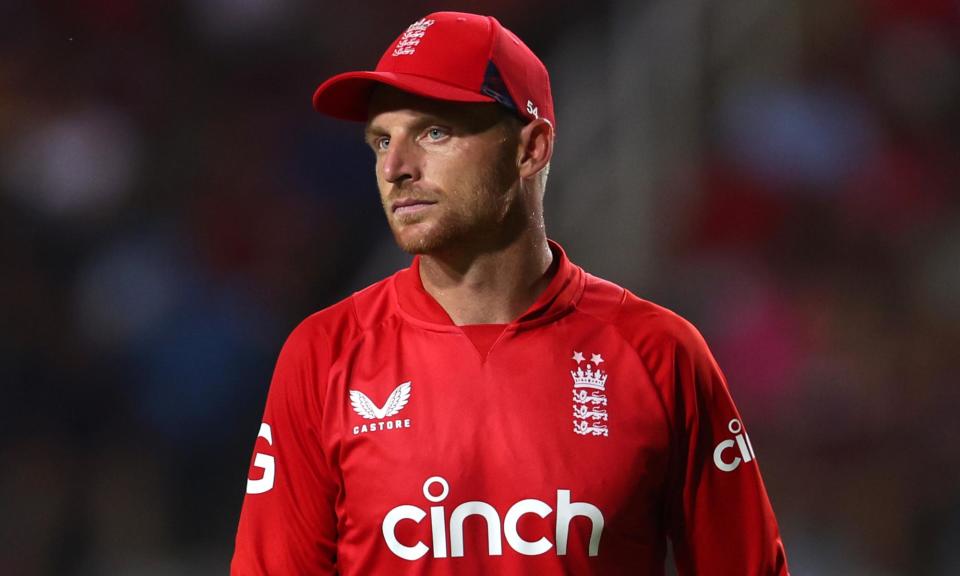Jos Buttler insists desire to lead England ‘burns strongly’ after West Indies loss

Jos Buttler has said it was wrong for people to question his captaincy of England’s white-ball team during a miserable 50-over World Cup campaign. The captain said that despite more disappointing results since their return from India they are an exciting and improving side, and that he is hugely motivated to lead them through another key year.
On Thursday England were beaten in the final fixture of their tour of the West Indies, in the process losing the T20 series 3-2 to follow a 2-1 defeat in the one-day internationals. The white-ball team do not play again until May, only days before they return to the Caribbean to defend their T20 World Cup title.
Related: India’s Sharma and Vastrakar make Australia suffer in women’s Test
Asked if he ever doubted his ability to lead the side, or felt results had given others the right to do so, Buttler said: “Not really. I’ve had some low moments, for sure. It was a huge disappointment in my career, that World Cup that’s just gone. But after you let the dust settle there’s huge motivation and determination to have another crack and just keep going. That desire still burns strongly.”
Buttler said he would use the festive period as an opportunity to reflect on his leadership of the team over the past 12 months. “I think you’re always trying to learn,” he said. “It’s important you learn and get better and try not to make the same mistakes. It’s the same for my own game as a player, I want to just get better and better and I feel like I’ve still got higher levels to reach.”
Including games as stand-in before his permanent appointment in June 2022, Buttler has now captained England 70 times. In the last two matches of the T20 series he did so, for the first time, from the outfield rather than behind the stumps. With Phil Salt, who has extensive wicketkeeping experience for Lancashire, Manchester Originals and in various franchise competitions, now established in the side and Jonny Bairstow, England’s Test wicketkeeper, in contention for a place in the World Cup squad, he has the option of giving up the gloves for good.
“I’ll probably take a few days to reflect on that,” Buttler said. “It’s nice sometimes during the over to be closer to the bowler – when you’re keeping wicket you can always run down and run back, but it’s just sort of [seen] from the outside that it’s slow or it doesn’t look right. So, I don’t know. I like the view as a wicketkeeper behind the stumps, to be able to see exactly what’s happening, but I enjoy fielding as well. I don’t really have any huge preference either way at the moment.”
Despite losing both the T20 and ODI series, Buttler insists the Caribbean tour was a success. “Obviously there’s been lots of ups and downs throughout the year but it’s always important to keep looking forward and that’s what we wanted to do at the start of this series,” he said.
“There’s lots to look forward to next year with the World Cup and I thought we played some really good cricket for the majority of the series.
“We all wanted to win the series and it’s hard to say when you’ve lost, but I think we’ve found out some good things. Obviously some players have stood up and done really well. We’ve had five games out here in the Caribbean and had a really good look at what conditions will be like for the World Cup only six months away. So yeah, it’s been a good series.”
Rovman Powell, West Indies captain, said England were definitely capable of retaining the World Cup, but while admitting their batters had dominated the third and fourth games of the series – “Two games back-to-back England beat us badly as a bowling group … they scored 70 in the powerplay, totally wrote us off” – he felt they had a collective weakness. “We realised something with the English batters: when you put them on a good wicket they are very good, but once a wicket starts [to] assist the bowlers it becomes a little bit tricky.”
Thursday’s final game featured the first significant use of the stopclock currently being trialled in international white-ball cricket, with England getting two warnings including one for taking more than 90 seconds rather than the mandated maximum of 60 to prepare for their penultimate over. A third infraction would have led to five runs being deducted from their score. “I knew you get two warnings, so I wasn’t really too bothered about being told I was slow at that point,” Buttler said. “Under pressure you sometimes need to take a little bit of extra time.”
